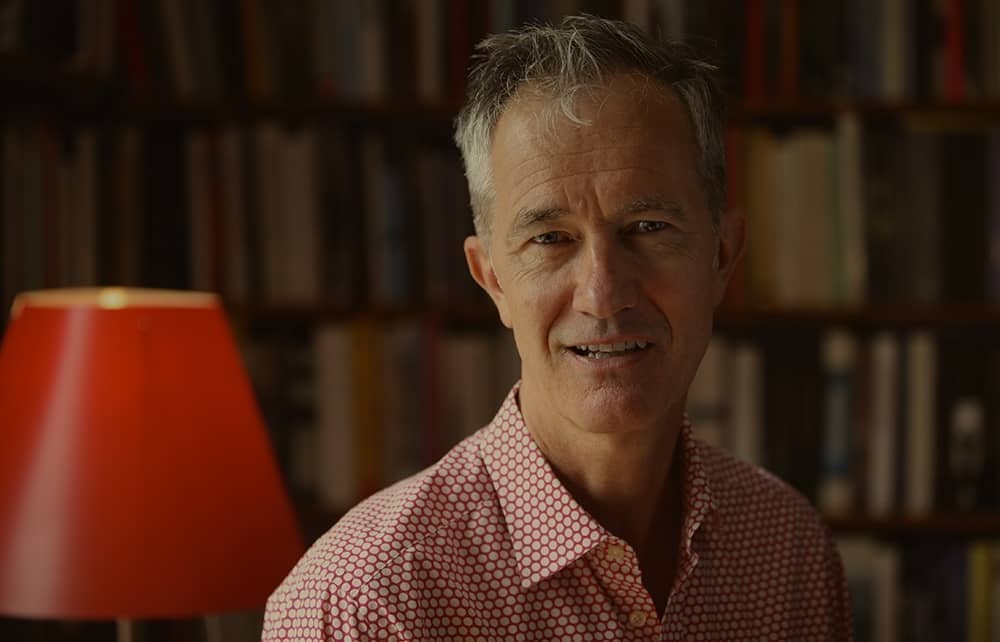This is not a book about tennis. Roger Federer appears early on, trailed by the obligatory question ‘When will he retire?’ He figures more prominently in the final 80 pages – still looking, despite the imminence of hanging up his racquet, as if he moves ‘within a different, more accommodating dimension of time’. There are cameos from some of the game’s other stars at various points on the way to the exit: the young Bjorn Borg (‘heir to some non-specific Scandinavian malaise’), the often crocked Andy Murray (‘a mumble-core Hamlet’) and the middle-aged, disgraced Boris Becker (afflicted by a ‘hitherto unseen condition called testicular elbow’). But the title is a characteristic act of wrong-footing. Although Geoff Dyer may love watching and writing about tennis, as well as biffing forehands, his favourite sport is playing the fool, presenting himself as a lazy flâneur, or guileless pilgrim, while actually engaged in self-examination and cultural critique.
The meat of The Last Days of Roger Federer is those ‘other endings’. Some are personal to Dyer: his final trip to the Burning Man festival; a related suspicion that he suffers from ‘a tendency to do things one time too many’; the feeling that in his sixties he has ‘drifted to the fringes of the sexual marketplace’. Others are contemplated at a distance: Bob Dylan’s interminable farewell tour; Nietzsche’s descent into madness; the dwindling of certain art forms; the retirement of George Best (‘It was the first time I knew of anyone stopping doing something they loved’). Yet in truth the distance is never great. Just as Dyer can’t write about himself without mentioning the artists who’ve distracted him from self-involvement, so he can’t write about other people without describing what it is to catch himself observing them.
The range of his interests is huge and unruly. He begins with the Doors, whose song ‘The End’ appeared on their debut album, and concludes with the photographer Edward Weston, who, with his wife Charis, stumbled on a corpse in the Colorado desert and captured an image of death at its most mundane. In a wink he skips from the TV series Succession to T. S. Eliot, from Milan Kundera to John Coltrane. Among the book’s larger presences are Beethoven, whose final compositions refract the terrors of death; J.M.W. Turner, whose incautious late works seemed to his contemporaries evidence of mental disease and moral decline; D.H. Lawrence, who weighed six stone in his final months, while conceding only that he was having ‘very slight tubercular trouble’; and Jack Kerouac, who launched his career with his best novel and spent the rest of his life a prisoner of the freedoms he’d unleashed.
Dyer writes amusingly and sometimes poignantly about the feeling of time running out, books he can’t finish (other people’s, and his own), the vicissitudes of artistic fame and the perversity of being invigorated by thoughts of quitting. As he has aged, he’s become aware of a special category of ‘things one comes round to at last’ – experiences acclaimed by others which one nevertheless finds unrewarding or unworthy of attention, until the day they suddenly seem necessary and miraculous. He cites as an example Powell and Pressburger’s The Life and Death of Colonel Blimp, a film he was for many years reluctant to watch, possibly deterred by the title. When he finally saw it in 2020 he was swept along and moved to tears, reflecting: ‘For all this time I’d been an incomplete person’ .
Few contemporary prose writers are as abundantly quotable as Dyer. But he is ambivalent about aphorism, and whenever there’s a chance of seeming earnest he compensates with a dab of laxity or flippancy. The laxity is a risk for someone so keen to diagnose the deterioration of other writers’ verbal acuity. ‘Things change as you get older,’ he writes, as he thinks about Kerouac – a remark equivalent to a tired underarm serve – and in similar vein he calls irony cruel, pathos awful, a bad car journey nerve-shredding and the life of a touring tennis pro a relentless grind which takes an inevitable toll. The flippancy is harder to wave through, whether he’s burlesquing writerly preciousness by pronouncing his breakfast eggs a ‘not ignoble soft scramble’ or wisecracking that, among his ailments, ‘it’s my neck that’s been the Achilles heel’.
Dyer’s books are held together by chutzpah, not design, and this one is essentially a collection of notes, numbered for ease of reference (his, not ours). Some are witty, soul-baring, elegantly meditative, and he can be splendidly droll about his own ineptitude. But this is writing as free jazz – expressive and adventurous, yet just as often torrential or noodly. Unlike his ostensible subject, he’ll extend a point for whimsy’s sake. He knows all the cute angles, but rarely follows through.






Comments